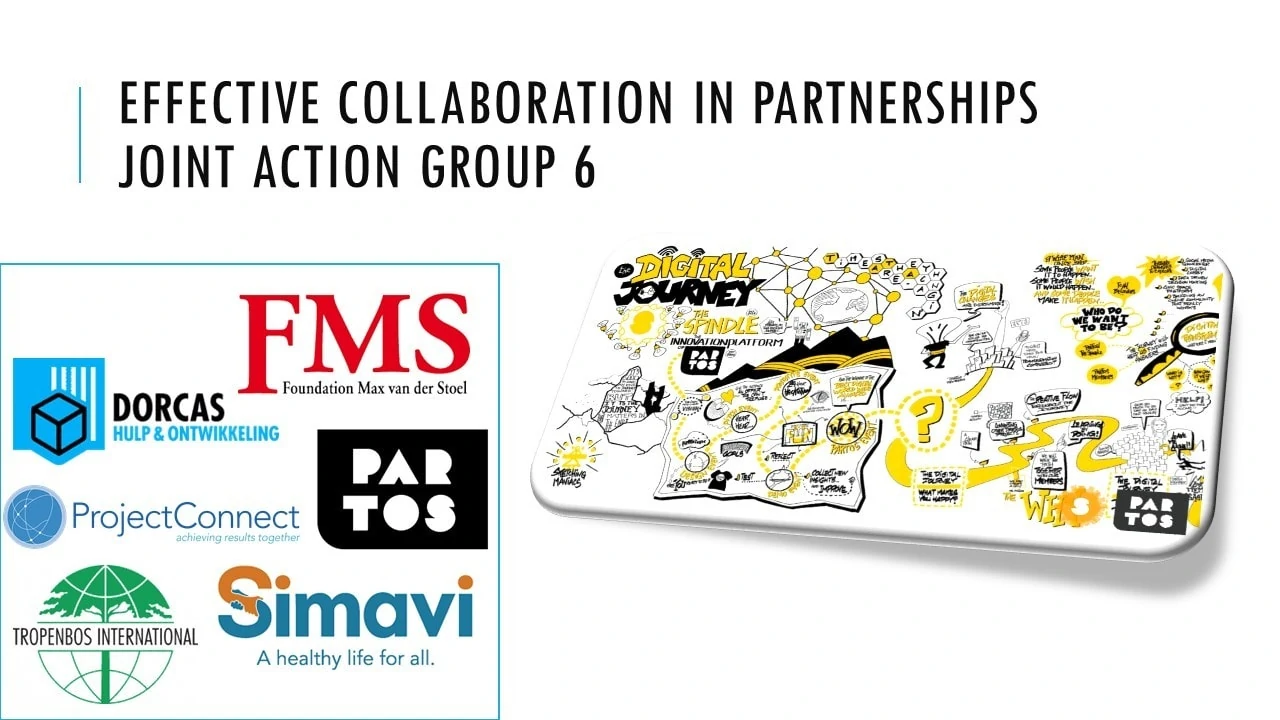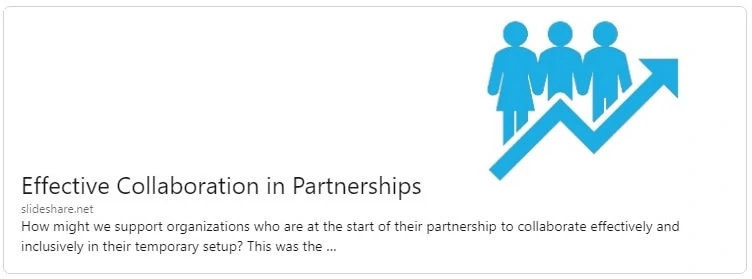
Joint Action Group #6
How might we support organizations who are at the start of their partnership to collaborate effectively and inclusively in their temporary setup? This was the central question for our Joint Action Group #6, part of the Spindle initiative of Partos. One of the Spindle projects addressed the Digital Journey, to build an innovation upon the needs of the Dutch development organizations and discover solutions for digital challenges. The Joint Action Group (JAG) consists of Tropenbos International, Simavi, Dorcas, Foundation Max van der Stoel and ProjectConnect Foundation. Merlijn Kouprie volunteered to moderate the remote JAG sessions.
The Process
Using Miro, a collaborative online whiteboard platform, the Group first identified six themes, that should be addressed and agreed upon in the initial phase of partnerships:
- Values, what do we consider to be required attitudes and behavior in our partnership?
- Governance, how do we organize our partnerships governance structure?
- Communication and meetings, how do we organize our partnerships communication and meetings?
- Finance, how do we organize our partnerships finance?
- PME & Learning, how do we organize our partnerships planning, reporting and learning activities?
- Data & Information, what kind of data and information do we collect and exchange?
Based on these six themes, participants brainstormed, discussed and concluded on a set of ‘guiding questions’, that partnerships can use to evaluate whether the different themes in the partnership are covered and agreed upon. Some examples of the guiding questions:
- (Governance) Are we aware of the (implicit) hierarchy and power balance?
- (Governance) How do we deal with conflict and ‘pink elephants’
- (Communication) How do we enable everyone to be at the table?
- (Finance) What will be the principles of budget division and allocation?
- (Data) What data & information systems are currently used by the organizations?
- (Data) What data and information do we want to share between organizations, can we make use of current internal systems and/or which tools are suitable to do this?
Then we asked ourselves the question, how valuable guidance in a practical manner could be provided to partnerships. We went through a series of creative exercises (adapted from the Design Sprint methodology) in order to explore a variety of solutions that could help solve our initial challenge. The Lightning Demos exercise helped to think outside the box and spark creativity, the 4-Step-Sketch supported us to structurally and individually come up with concepts. The Gallery Walk made the team come to a joint decision which concept to take further. And the Storyboarding exercise helped to create a high-level user task flow to be tested with the future users. The result of our process was a web-portal that is a virtual knowledge exchange where NGOs can receive guidance in the initial phase of a partnership. We adopted the metaphor of a roadmap, to visualize the route for a specific partnership along the six themes.
The outcome
The storyline of the portal was presented during the Demo day at September 10, for an audience of NGOs and related organizations. See below for the presentation.

The portal provides introductory video’s, to explain the objective of effective cooperation in partnerships. Each of the six themes are highlighted in short video’s, to help the user gain understanding of the relevance of each theme in a partnership. Then the journey starts:
Build your roadmap
To acknowledge that each partnership is different, and therefore the relevance of themes might be different, the user (NGO representative) can build a custom roadmap. Supported by the guiding questions, the user can select the guiding questions that should be addressed in a specific partnership. This is essentially a scoping phase, and results in a custom roadmap with questions and topics to be discussed and agreed upon. The custom roadmap is visualized in a ‘highway’, depicting the start and finish and the milestones in-between. This custom roadmap should be agreed upon by the representatives of the partnership organizations. Transparency in designing the process is conditional for building trust in the outcomes.
Along the ‘route’
Upon deciding on the roadmap, the organizations start the route by working together, meeting and actively engaging in the thematic discussions. Per milestone or per guiding question, the portal provides a ‘travel guide’ on how-to moderate the discussion, accompanied by active and creative methods, formats, practices and examples. Templates for whiteboards are provided in the portal, as well as instructions on how-to effectively use the methods.
The meetings can be held by using standard meeting tools, such as Teams or Zoom, and accompanied with whiteboard tools, such as Miro.
Documenting conclusions and decisions
All conversations are intended to draw conclusions about working together in the partnership, which are documented into various formats of documents, such as MoU’s, partner agreements, etc. These documents are linked to the roadmap and accessible for all partners. From this perspective, the portal also functions as a ‘collective memory’, allowing the partners, even years down the road, to consult the agreements that were documented during the initial phase of the partnership.
Learning and co-creation
Finally, the portal should allow to document lessons learned, for other partnerships to prevent stepping into common pitfalls. New templates can be added by others, to contribute and enrich the content of the portal, and to help later partnerships designing and performing an even more effective cooperation.
What’s next?
The above portal was presented during the Demo-day and received recognition from the audience for addressing the problems that typically occur during the (initial) phases of a partnership. We’re also looking for your feedback, suggestions or comments.
If you are interested in working on this concept, or even to contribute and engage actively to this initiative, please contact The Spindle.
Share this article: